Agree的用法
agree的用法及解释

agree的用法及解释对于agree的用法,常常被很多人忽略,其实对初学者来说,agree是一个常见的词汇,它的用法有很多,那么你了解多少呢?下面是小编给大家带来的agree的用法及解释_agree的六个用法总结,以供大家参考,我们一起来看看吧!agree的解释v. 同意; 赞成; (对…) 取得一致意见,一致同意; 应允; 答应;[例句]If we agreed all the time it would be a bit boring, wouldn't it?如果我们总是意见一致,就会有点无趣,对吗?[其他] 第三人称单数:agrees 现在分词:agreeing 过去式:agreed 过去分词:agreedagree to,agree with,agree on,agree about的用法区别.1.agree (to sth) 意为“同意;愿意;答应(某事物)”.如:Is he going to agree to our suggestion?他会同意我们的建议吗?2.agree with sb 意为“适合(某人的健康或胃口)”,尤用于否定句或疑问句中.如:The climate there doesn\'t agree with him.那里的气候对他不合适.3.agree (with sb) (about / on sth) 意为“同意;(与某人)意见一致”.如:We couldn\'t agree on a date/ when to meet.关于日期(什么时候见面),我们没有能取得一致意见.4.agree sth意为“在某事物上取得一致意见;商定”.如:Can we agree a price?我们能不能商定一个价格?5.agree (with sth) 意为“与(某事物)相一致;相符合;相吻合”.如:Your thoughts didn\'t agree with mine.你的想法和我的想法不一致.6.be agreed(on /about sth)意为“达成协议;意见一致”.如:We are all agreed on the best action.我们都同意这一最佳措施.7.agree后面还可以接宾语从句,即be agreed that ...如:It was agreed that another meeting was necessary.大家都认为有必要再开一次会.agree的六个用法agree一般与with连用,agree with sb.,表示同意某人的观点agree vt. & vi. 基本用法如下1)单独使用,表示同意、答应等。
agree的用法与练习

⽆忧考英语资源频道为⼤家整理的agree的⽤法与练习,供⼤家阅读参考。
agree是⼀个使⽤范围很⼴的单词,意为“同意;赞同”。
它有很多相关词组,现在把其主要⽤法归纳如下:1. agree (to sth) 意为“同意;愿意;答应(某事物)”。
如:Is he going to agree to our suggestion? 他会同意我们的建议吗?2. agree with sb 意为“适合(某⼈的健康或胃⼝)”,尤⽤于否定句或疑问句中。
如:The climate there doesn't agree with him.那⾥的⽓候对他不合适。
3. agree (with sb) (about / on sth) 意为“同意;(与某⼈)意见⼀致”。
如:We couldn't agree on a date/ when to meet. 关于⽇期(什么时候见⾯),我们没有能取得⼀致意见。
4. agree sth意为“在某事物上取得⼀致意见;商定”。
如:Can we agree a price? 我们能不能商定⼀个价格?5. agree (with sth) 意为“与(某事物)相⼀致;相符合;相吻合”。
如:Your thoughts didn't agree with mine. 你的想法和我的想法不⼀致。
6. be agreed(on /about sth)意为“达成协议;意见⼀致”。
如:We are all agreed on the best action. 我们都同意这⼀措施。
7. agree后⾯还可以接宾语从句,即be agreed that ...如:It was agreed that another meeting was necessary. ⼤家都认为有必要再开⼀次会。
agree的英语常见用法

agree的英语常见用法下面是小编整理的一些关于agree的常见用法,希望对大家有帮助。
1.agree用作及物动词,后面可以接that引导的宾语从句。
(1). He didn't agree that it was a mistake. 他不承认这是错误的。
(2). I agree that the book is well worth reading.我同意这本书值得一读。
2.agree可用作不及物动词,表示“同意”、“答应”或指(两个人或更多的人)合得来,“和睦相处,意气相投”。
(1).I asked him to help me and he agreed.我请他帮助我,他同意了。
(2).He proposed marriage to Mary, but she didn't agree. 他向玛丽求婚,但她拒绝了。
(3).We shall never agree.我们将永不会合得来。
(4). Why can't your children agree together? 你们小孩子为什么不能在一起和睦相处呢?3.agree作为不及物动词,后面接动词不定式,表示“答应”、“同意”,例如:(1).He agreed to help us. 他同意帮助我们。
(2).We agree to start early.我们同意早动身。
4.agree 作为不及物动词,可以和一些介词(如with\on \to\in \about等)组成一系列词组。
第一、agree和to 连用,to 后面一般接表示“计划”、“建议”、“办法”等。
例如:* They agreed to my proposal.他们同意我的建议。
* Does he agree to this plan? 他同意这个计划吗?第二、agree 和about连用。
表示“对(某件事)同意”。
如:* They all agreed about it.他们大家都对此表示同意。
agree的用法和固定搭配
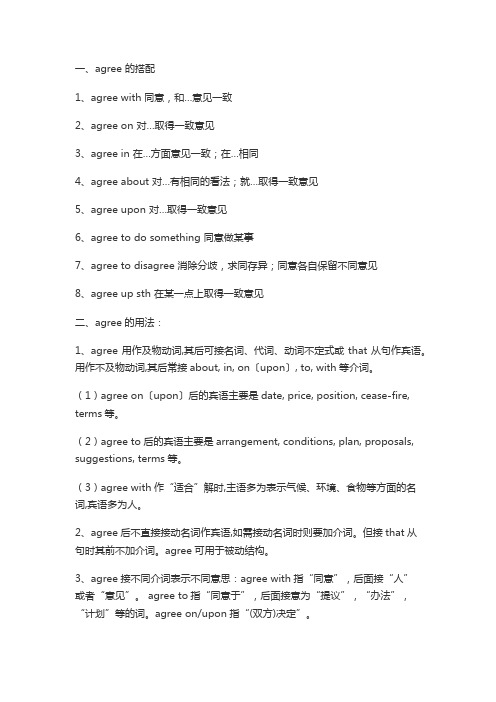
一、agree 的搭配1、agree with 同意,和…意见一致2、agree on 对…取得一致意见3、agree in 在…方面意见一致;在…相同4、agree about 对…有相同的看法;就…取得一致意见5、agree upon 对…取得一致意见6、agree to do something 同意做某事7、agree to disagree 消除分歧,求同存异;同意各自保留不同意见8、agree up sth 在某一点上取得一致意见二、agree的用法:1、agree用作及物动词,其后可接名词、代词、动词不定式或that从句作宾语。
用作不及物动词,其后常接about, in, on〔upon〕, to, with等介词。
(1)agree on〔upon〕后的宾语主要是date, price, position, cease-fire, terms等。
(2)agree to后的宾语主要是arrangement, conditions, plan, proposals, suggestions, terms等。
(3)agree with作“适合”解时,主语多为表示气候、环境、食物等方面的名词,宾语多为人。
2、agree后不直接接动名词作宾语,如需接动名词时则要加介词。
但接that从句时其前不加介词。
agree可用于被动结构。
3、agree接不同介词表示不同意思:agree with指“同意”,后面接“人”或者“意见”。
agree to指“同意于”,后面接意为“提议”,“办法”,“计划”等的词。
agree on/upon指“(双方)决定”。
4、agreed指“互相同意的”,作为不及物动词的过去分词时,可作形容词,后可接that从句。
5、agree也可作为及物动词的过去分词。
agreed to do表示“在别人建议下同意做某事”,而agreed in doing表示“彼此间相互同意做某事”;。
agree短语归纳总结

agree短语归纳总结
关于“agree”的短语归纳总结如下:
1.agree with sb/sth:表示同意某人或某事的观点、意见等。
例如:“I agree with what you say.”(我同意你说的。
)
2.agree to sth:表示同意某个计划、建议、条款等。
例如:“We agreed to the proposal.”(我们同意了这个提案。
)
3.agree on/about sth:表示在某事上达成一致意见。
例如:“We agreed on the date for the meeting.”(我们就会议日期达成了一致。
)
4.agree to do sth:表示同意做某事。
例如:“They agreed to help us with the project.”(他们同意在这个项目上帮助我们。
)请注意,在实际使用中,这些短语的具体用法可能会根据语境和搭配的词汇有所不同。
建议查阅权威词典或请教英语老师,以确保准确使用这些短语。
agree的用法总结

agree的用法总结agree表示同意,赞成,下面小编给大家整理了agree的用法总结,希望大家喜欢!agree有哪些意思同意;赞成eg: I didn’t agree with him because I felt he was wrong.我不同意他的说法,因为我觉得他是错的。
(对…)取得一致意见,一致同意eg: They all agreed to take a bus to the train station.他们一致同意坐公交车去汽车站。
应允;答应;同意eg: He asked for a promotion and the manager agreed.他要求升职,经理答应了。
商定;约定eg: The two companies wanted to agree a price through negotiation.这两个公司想要通过协商来商定一个价格。
批准,认可(计划、要求等)eg: His proposal has been agreed at the meeting.他的提案在会上已经获得批准了。
与……相符,与……一致eg: What you said doesn’t agree with her description.你说的和她的描述不一致。
agree的具体用法agree可作及物动词,后面加名词、代词或that 从句。
eg: I agree that your bike is newer than mine.我承认你的自行车比我的新。
agree with后面可以接人,也可以接表示看法、建议、分析、想法等之类的词。
eg: I agree with her.我同意她。
I agree with her analysis.我同意她的分析。
agree to中的to为介词时,后面可以加表示计划、方法、安排的词或者动名词。
当to为小品词时,后面可以接动词原形。
注意没有agree sb. to do sth.的说法。
agree 的读法、释义和用法

agree 的读法、释义和用法
Agree的读法、释义和用法
读法:Agree的发音为英式英语/əˈɡriː/ 和美式英语/əˈɡri/。
注意将重音放在第一个音节“a”上,并保持元音“ə”和“ɡriː”或“ɡri”的清晰发音。
释义:Agree的基本含义是“同意”或“一致”,表示某人在观点、意见或行动上与他人保持一致或相符。
用法:
1.表示同意:Agree最常用的用法是表示某人同意某个观点、意见或建议,如“I agree with you.”(我同意你的看法。
)
2.表示一致:除了表示同意外,Agree还可以表示两个或多个事物之间的一致或相符,如“The results agree with the predictions.”(结果与预测一致。
)
3.作为及物动词:Agree可以用作及物动词,接名词或代词作宾语,表示同意的对象或内容。
4.作为不及物动词:Agree也可以用作不及物动词,表示某人或某事物在观点、意见或行动上与他人或他事物一致。
总之,Agree是一个常用的动词,用于表示同意或一致。
在使用时,需要根据具体的语境选择合适的释义和用法,并注意与其他词汇的搭配使用。
agree做及物动词用法

agree做及物动词用法
agree作为及物动词的用法如下:
1.表示同意对方的意见、看法、观点时,可用agree with sb,此时谓语动词用单数形式。
例句:I agree with you regarding the proposed changes.
关于所提出的修改意见,我同意你的看法。
2.表示“(食物、天气、健康状况)适宜”时,可用agree with sb/sth,此时谓语动词用单数形式。
例句:I think the wine will agree with your constitutions.
我想这种酒合你的口味。
3.表示“在看法、判断、分析方面取得一致意见或达成协议”时,常用agree on sth或agree to sth。
例句:The teaching assistants all agree on the need to limit the size of the class.
辅导教师们就限制班级规模的必要性达成了一致意见。
4.表示“签订协议”时,常用agree to do sth。
例句:We must try to agree to the new plans.
我们必须设法同意那些新计划。
agree的过去式和用法例句是什么意思
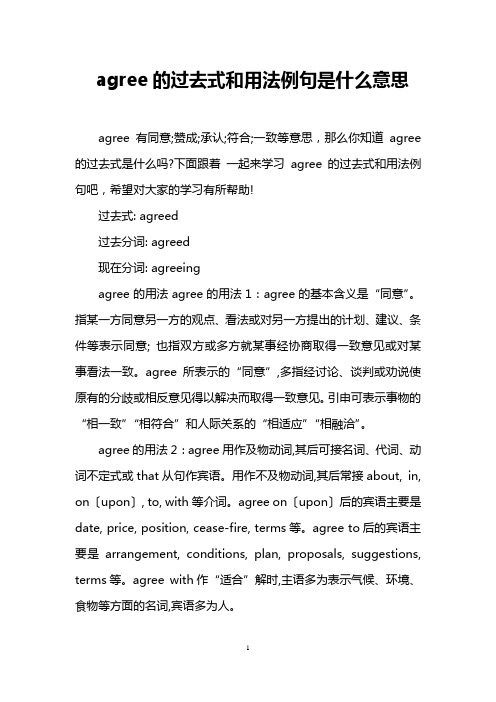
agree的过去式和用法例句是什么意思agree有同意;赞成;承认;符合;一致等意思,那么你知道agree 的过去式是什么吗?下面跟着一起来学习agree的过去式和用法例句吧,希望对大家的学习有所帮助!过去式: agreed过去分词: agreed现在分词: agreeingagree的用法agree的用法1:agree的基本含义是“同意”。
指某一方同意另一方的观点、看法或对另一方提出的计划、建议、条件等表示同意; 也指双方或多方就某事经协商取得一致意见或对某事看法一致。
agree所表示的“同意”,多指经讨论、谈判或劝说使原有的分歧或相反意见得以解决而取得一致意见。
引申可表示事物的“相一致”“相符合”和人际关系的“相适应”“相融洽”。
agree的用法2:agree用作及物动词,其后可接名词、代词、动词不定式或that从句作宾语。
用作不及物动词,其后常接about, in, on〔upon〕, to, with等介词。
agree on〔upon〕后的宾语主要是date, price, position, cease-fire, terms等。
agree to后的宾语主要是arrangement, conditions, plan, proposals, suggestions, terms等。
agree with作“适合”解时,主语多为表示气候、环境、食物等方面的名词,宾语多为人。
agree的用法3:agree后不直接接动名词作宾语,如需接动名词时则要加介词。
但接that从句时其前不加介词。
agree可用于被动结构。
agree的用法4:agree以往主要用作不及物动词,作及物动词的用法是严格限制在会计用语中的。
例如:The inspector of taxes has now agreed your claim for expenses.税务稽查员已同意你提出的费用要求。
Do you agree the bill?你同意这张单据吗?agree的用法5:对句型agree to do sth,有人说是agree加动词不定式; 有人说是agree to+动词原形; 也有人说是agree to+动词不定式,两个to合二为一。
短语词汇agree的用法

短语词汇agree的用法短语词汇agree的用法,快来一起学习吧。
下面就和大家分享,来欣赏一下吧。
短语词汇agree的用法1. agree with(1) 表示同意某人或某人的意见、想法、分析、解释等(即持同一观点)。
如:I quite agree with you. 我完全同意你的意见。
We agree with what you say. 我们同意你说的。
(2) 表示“(食物、天气、工作等)对……适宜”。
如:The food does not agree with me. 这食物对我不适合。
Hard work does not agree with him. 艰苦的工作对他不适宜。
(3) 表示“与……一致”。
如:His story agrees with the facts. 他的陈述与事实相符。
A verb must agree with its subject in person and number. 动词必须和它的主语在人称和数方面保持一致。
2. agree to(1) 后接某些名词,表示同意或接受某事,尤其指别人提出的某事,有时可能是自己不喜欢的事。
He agree the plan (the date)。
他同意了这个计划(日期)。
We agreed to their arrangement. 我们同意了他们的安排。
I was forced to agree to it,but at heart I didn’t quite agree with it. 我.应,但内心并不完全同意。
(2) 后接动词原形(此时to是不定式符号)或动名词(一般有逻辑主语,此时to 是介词)。
如:We agreed to leave early. 我们同意早点出发。
She agreed to my going home. 她同意我回去。
注:英语不说agree sb to do sth.如不说:.She agreed me to go home.3. agree on [upon](1) 主要指双方通过协商而取得一致意见或达成协议。
agree是什么意思及介词搭配用法

agree是什么意思及介词搭配用法agree的基本含义一、不及物动词vi.1、(对提议、计划、条件等)表示同意,赞成(to); (对意见等)表示赞同(with):例句:I cannot agree with your opinions.我不能同意你的观点。
Do you agree to the conditions?你同意这些条件吗?2、(意见)相同,(与某人)持相同意见,持一致看法(with):例句:I agree with him.我的意见和他的相同。
3、(就价钱、条件等)达成协议,商定 (about, on, upon):例句:They have agreed on the terms of surrender.他们就投降条件达成了协议。
The two groups agreed on a cease-fire.两派达成了停火协议。
4、表示愿意,应允,答应:例句:I agree to leave at once.我答应即刻离开。
5、(性情等)投合;相符,相同,一致(with):例句:This story agrees with his.这个叙述与他的叙述一致。
6、和睦相处:例句:They can'tagree well.他们无法和睦相处。
7、(食物、气候等)相宜,适宜,适合(with):例句:The food did not agree with her.这种食物不合她的胃口。
The climate agrees with me fairly well.这气候对我非常适宜。
二、及物动词vt.1、造成,同意;承认[后接名词从句]:例句:I agree that she is the ablest of us.我承认她是我们之中最能干的一个。
2、对…达成协议,就…取得一致意见;对(提议、计划、条件等)表示同意;对(意见等)表示赞同:例句:I must agree your plans.我应该赞成你的计划。
agree的用法归纳

agree的意思和⽤法归纳: vt.& vi.同意,赞同; vi.[语]⼀致,符合; 商定,约定; 意见相合; (⽓候、⾷物等)适宜; vt.同意,承认; 使和谐⼀致; 认为正确⽆误; agree的⽤法归纳: 1. agree with (1) 表⽰同意某⼈或某⼈的意见、想法、分析、解释等 (即持同⼀观点)。
如: I quite agree with you. 我完全同意你的意见。
We agree with what you say. 我们同意你说的。
(2) 表⽰“与……⼀致”。
如: His story agrees with the facts. 他的陈述与事实相符。
A verb must agree with its subject in person and number. 动词必须和它的主语在⼈称和数⽅⾯保持⼀致。
(3) 表⽰“(⾷物、天⽓、⼯作等)对……适宜”。
如: The food does not agree with me. 这⾷物对我不适合。
Hard work does not agree with him. 艰苦的⼯作对他不适宜。
2. agree to (1) 后接某些名词,表⽰同意或接受某事,尤其指别⼈提出的某事,有时可能是⾃⼰不喜欢的事。
He agree the plan (the date). 他同意了这个计划(⽇期)。
We agreed to their arrangement. 我们同意了他们的安排。
I was forced to agree to it, but at heart I didn’t quite agree with it. 我被迫答应,但内⼼并不完全同意。
(2) 后接动词原形(此时to是不定式符号)或动名词(⼀般有逻辑主语,此时 to 是介词)。
如: We agreed to leave early. 我们同意早点出发。
Agree的用法

Agree的用法agree后面接介词法比较复杂,常见用法有:(1) 涉及讨论的题目用about。
They never agree about politics. 关于政治问题,他们总是意见不一致。
(2)要确定一样事情用on。
Can we agree on a date for the next meeting? 我们能不能为下次会议确定一个时间?(3)涉及一件建议或计划用to。
He’s agreed to our suggestion about the holiday. 他已经同意我们关于假日的计划了。
(4)涉及意思、想法、分析、解释以及涉及人的时候用with。
They might not agree with his opinions. 他们可能不同意他的意见。
(5)agree后可接动词不定式或宾语从句。
We agree to leave at once. 我们同意马上离开。
agree一般常用口语用法(1)I can't argue with you about that.我无法与您争辩那件事。
(2)You can say that again.您说的对极了。
(3)You took the words right out of my mouth.您已说出我心里的话。
(4)I was about to say the same thing.我正想提出同样看法。
(5)I couldn't agree with you more.我极表同意您的看法。
注意上列类似用语"I couldn't agree with you more.",按字面翻译为「我无法再更加同意您了」,实则表「我对您极表同意」。
注意这是固定句型,助动词必须用couldn't,而不可用can't。
1. agree with①表示同意某人或某人的意见、想法、分析、解释等(即持同一观点):I don’t agree with you. 我不同意你的意见。
短语词汇agree的用法
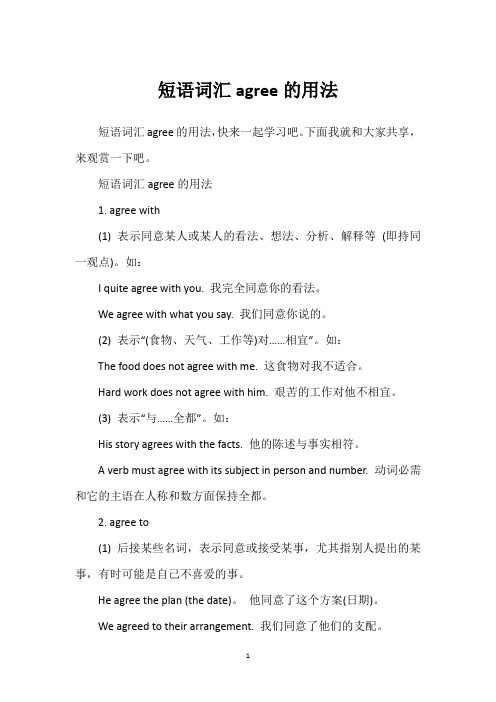
短语词汇agree的用法短语词汇agree的用法,快来一起学习吧。
下面我就和大家共享,来观赏一下吧。
短语词汇agree的用法1. agree with(1) 表示同意某人或某人的看法、想法、分析、解释等(即持同一观点)。
如:I quite agree with you. 我完全同意你的看法。
We agree with what you say. 我们同意你说的。
(2) 表示“(食物、天气、工作等)对……相宜”。
如:The food does not agree with me. 这食物对我不适合。
Hard work does not agree with him. 艰苦的工作对他不相宜。
(3) 表示“与……全都”。
如:His story agrees with the facts. 他的陈述与事实相符。
A verb must agree with its subject in person and number. 动词必需和它的主语在人称和数方面保持全都。
2. agree to(1) 后接某些名词,表示同意或接受某事,尤其指别人提出的某事,有时可能是自己不喜爱的事。
He agree the plan (the date)。
他同意了这个方案(日期)。
We agreed to their arrangement. 我们同意了他们的支配。
I was forced to agree to it,but at heart I didn’t quite agree with it. 我.应,但内心并不完全同意。
(2) 后接动词原形(此时to是不定式符号)或动名词(一般有规律主语,此时to 是介词)。
如:We agreed to leave early. 我们同意早点动身。
She agreed to my going home. 她同意我回去。
注:英语不说agree sb to do sth.如不说:.She agreed me to go home.3. agree on [upon](1) 主要指双方通过协商而取得全都看法或达成协议。
英语单词agree的三种常见用法详解
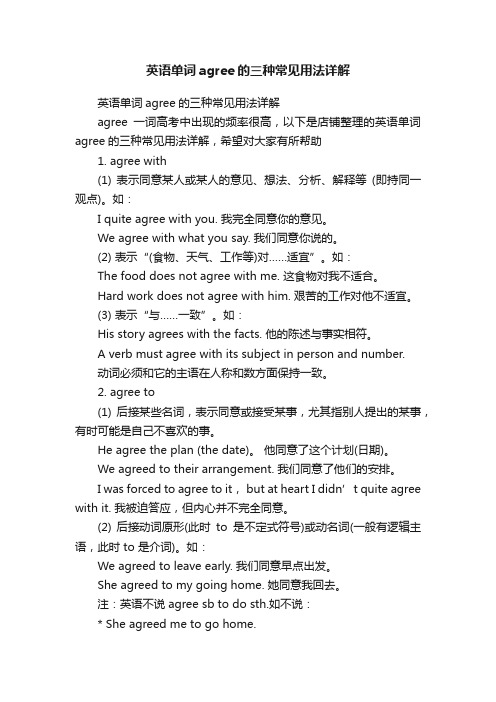
英语单词agree的三种常见用法详解英语单词agree的三种常见用法详解agree一词高考中出现的频率很高,以下是店铺整理的英语单词agree的三种常见用法详解,希望对大家有所帮助1. agree with(1) 表示同意某人或某人的意见、想法、分析、解释等(即持同一观点)。
如:I quite agree with you. 我完全同意你的意见。
We agree with what you say. 我们同意你说的。
(2) 表示“(食物、天气、工作等)对……适宜”。
如:The food does not agree with me. 这食物对我不适合。
Hard work does not agree with him. 艰苦的工作对他不适宜。
(3) 表示“与……一致”。
如:His story agrees with the facts. 他的陈述与事实相符。
A verb must agree with its subject in person and number.动词必须和它的主语在人称和数方面保持一致。
2. agree to(1) 后接某些名词,表示同意或接受某事,尤其指别人提出的某事,有时可能是自己不喜欢的事。
He agree the plan (the date)。
他同意了这个计划(日期)。
We agreed to their arrangement. 我们同意了他们的安排。
I was forced to agree to it,but at heart I didn’t quite agree with it. 我被迫答应,但内心并不完全同意。
(2) 后接动词原形(此时to是不定式符号)或动名词(一般有逻辑主语,此时 to 是介词)。
如:We agreed to leave early. 我们同意早点出发。
She agreed to my going home. 她同意我回去。
注:英语不说 agree sb to do sth.如不说:* She agreed me to go home.3. agree on [upon](1) 主要指双方通过协商而取得一致意见或达成协议。
agree的用法
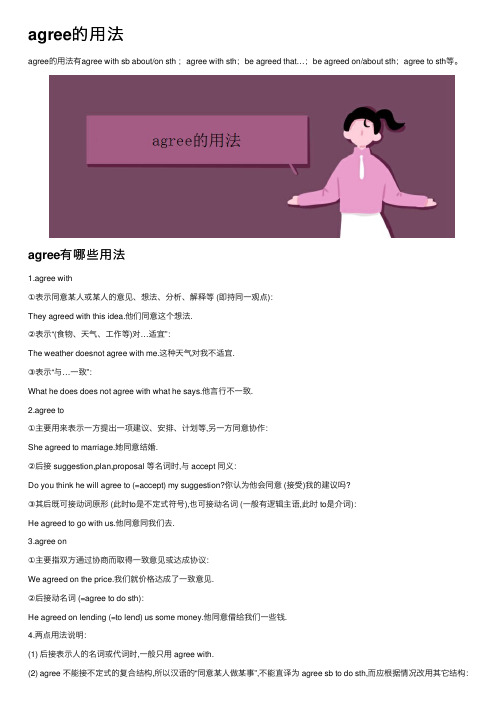
agree的⽤法agree的⽤法有agree with sb about/on sth ;agree with sth;be agreed that…;be agreed on/about sth;agree to sth等。
agree有哪些⽤法1.agree with①表⽰同意某⼈或某⼈的意见、想法、分析、解释等 (即持同⼀观点):They agreed with this idea.他们同意这个想法.②表⽰“(⾷物、天⽓、⼯作等)对…适宜”:The weather doesnot agree with me.这种天⽓对我不适宜.③表⽰“与…⼀致”:What he does does not agree with what he says.他⾔⾏不⼀致.2.agree to①主要⽤来表⽰⼀⽅提出⼀项建议、安排、计划等,另⼀⽅同意协作:She agreed to marriage.她同意结婚.②后接 suggestion,plan,proposal 等名词时,与 accept 同义:Do you think he will agree to (=accept) my suggestion?你认为他会同意 (接受)我的建议吗?③其后既可接动词原形 (此时to是不定式符号),也可接动名词 (⼀般有逻辑主语,此时 to是介词):He agreed to go with us.他同意同我们去.3.agree on①主要指双⽅通过协商⽽取得⼀致意见或达成协议:We agreed on the price.我们就价格达成了⼀致意见.②后接动名词 (=agree to do sth):He agreed on lending (=to lend) us some money.他同意借给我们⼀些钱.4.两点⽤法说明:(1) 后接表⽰⼈的名词或代词时,⼀般只⽤ agree with.(2) agree 不能接不定式的复合结构,所以汉语的“同意某⼈做某事”,不能直译为 agree sb to do sth,⽽应根据情况改⽤其它结构:agree三种⽤法agree with(1)表⽰同意某⼈或某⼈的意见、想法、分析、解释等 (即持同⼀观点)。
- 1、下载文档前请自行甄别文档内容的完整性,平台不提供额外的编辑、内容补充、找答案等附加服务。
- 2、"仅部分预览"的文档,不可在线预览部分如存在完整性等问题,可反馈申请退款(可完整预览的文档不适用该条件!)。
- 3、如文档侵犯您的权益,请联系客服反馈,我们会尽快为您处理(人工客服工作时间:9:00-18:30)。
Agree的用法agree后面接介词法比较复杂,常见用法有:(1) 涉及讨论的题目用about。
They never agree about politics. 关于政治问题,他们总是意见不一致。
(2)要确定一样事情用on。
Can we agree on a date for the next meeting? 我们能不能为下次会议确定一个时间?(3)涉及一件建议或计划用to。
He’s agreed to our suggestion about the holiday. 他已经同意我们关于假日的计划了。
(4)涉及意思、想法、分析、解释以及涉及人的时候用with。
They might not agree with his opinions. 他们可能不同意他的意见。
(5)agree后可接动词不定式或宾语从句。
We agree to leave at once. 我们同意马上离开。
agree一般常用口语用法(1)I can't argue with you about that. 我无法与您争辩那件事。
(2)Y ou can say that again. 您说的对极了。
(3)You took the words right out of my mouth. 您已说出我心里的话。
(4)I was about to say the same thing. 我正想提出同样看法。
(5)I couldn't agree with you more. 我极表同意您的看法。
注意上列类似用语"I couldn't agree with you more.",按字面翻译为「我无法再更加同意您了」,实则表「我对您极表同意」。
注意这是固定句型,助动词必须用couldn't,而不可用can't。
Each与every都有“每个”的意思,但二者含义及语法功能不同,主要区别是:一、1. ea ch既可用作形容词,又可用作代词,在句中可以作定语,主语、宾语、同位语、状语等。
例如:1.Each student has his own dictionary . (形容词,定语) 2.Each has his goo d point . (代词,主语)3.Our headteacher had a talk with each of us . (代词,宾语)4.The students each have a desk . (代词,同位语,不影响谓语动词的单复数)5. The children can have a bag each . (副词,状语)二. each与every都可用作形容词,在句中作定语,但each更强调个人或个别,every更强调全体或全部。
比较:I know eac h member of your family . 我认识你们家的每个成员。
I know every member of your family . 我认识你们家的每个成员。
三. each指两个或两个以上的人或事物中的“每个”;e very是指许多人或事物的“全体”,与all的意思相近。
试译:这条街上每边都有很多商店。
[误]There are many shops on every side of the street . [正]There are many sh ops on each side of the street . 我给她父母每人一件礼物。
[误]I gave a present to every one of her parents . [正]I gave a present to each of her parents . 四. each 单独作主语或each、every修饰的单数名词作主语时,谓语动词为单数形式,但each of t hem作主语时,谓语动词用单数或复数形式都可以。
例如:Each / Each person / Every person is living a happy life now . 人人都过着幸福生活。
Each of them are / is wear ing full dress . 他们个个都身着盛装。
五. every可以与not连用构成部分否定,意思是“并不/非人人”,而each则不可以与not连用。
全部否定是no one ,意思是“个个都不”、“没有人”等。
例如:Each / Everyone / Every one of them doesn’t like the TV play . 并非人人都喜欢电视剧部分否定No one likes the TV play . 完全否定六. 表示“每隔……”、“每……”,要用“every+基数词+复数名词”。
这种结构中的every不能用each替代。
例如:They’ll choose one out of every ten girls . We hand in our homework every three days .award n. 奖, 奖品vt. 奖励,授予:因优点或善行而给予reward n.(名词)报答,报应:为相应的行为做酬劳v.tr.(及物动词)报答,奖赏,酬劳award 侧重于奖励reward 侧重于报答(某人、某事)意思是不一样的case, stage, point,situation, point,job等做先行词(2012-07-16 16:15:31)转载▼标签:定语从句杂谈分类:英语充电在定语从句中case,point,situation,stage,point等做先行词,关系副词可以用where,但并不是特定词,而是要结合具体语境。
例如:—What do you think of teaching, Bob?—I find it fun and challenging. It is a job( where ) you are doing something serious but interesting.We will discuss a number of cases ( where ) beginners of English fail to use the language preperly.He was driving so fast as to get himself into a dangerous situation ( where ) he is likely to lose the control over his car.千万注意:situation,condition,state,activity,job,occasion等做先行词后面的定语从句未必一定就是where,关键还是分析从句中缺什么成分,若缺主表宾,即先行词可以在后面从句中做主表宾,此时需要选用关系代词而不是where。
例如:This is the job that he offered to me.I wasn't clear about the situation that he was in at that moment.当先行词为point, situation, case 时定语从句用where引导。
除了这些词还有那些名词呢business, condition, surroundings,world ,society, spot,stage ,sorrondings模糊先行词有些什么①当先行词为case,condition,situation,position,point,stage等名词,表示情况、方面、处境时用关系副词where. ②当先行词是case, condition, situation, position, point, stage 等名词时,表示情况、方面、处境时,用关系副词where.但先行词是occasion时,用关系副词when. ③当 situation, condition, stage, point,scenes 做先行词时,用 where 引导定语从句④occasion, point, stage等名词是表示时间节点的时候,其后的定语从句就用when引导,在从句中作时间状语AlCl3为什么是共价化合物啊采纳率:47% 10级 2013.09.24这个是看极化,变形性质的Al3+由于带的电荷多,并且原本半径就小,使得它的正电荷密度很高而Cl-半径大,核外电子多,带的负电荷密度也很大这样当两者遇到一起的时候,Al3+显示出了强大的极化性,Cl-显示出强大的变形性,即Cl-的电子云被Al3+扭曲变性偏向了Al3+ 这样就使得Al3+的电性被中和了一些,而不是电子的得失这么简单,而是电子云的偏移,具有共价键的性质,所以说它是共价化合物像铝,锡等位于金属与非金属分界线附近的主族元素和某些副族元素是具有一定非金属性的,最具有代表性的表现就是氢氧化物的两性和一些卤化物或氧化物是共价化合物,并不是所有物质最外层电子都达到稳定结构共价化合物的盐有AlCl3,BeCl2,SnCl4,HgCl2,GeCl4,AuCl 3等1、I will start fresh,be some one new.我要重新开始,做不一样的自己。
2、It's the only way I'll make it through.这是我能挺过去的唯一办法。
3、No comment.不予评论4、You need to chill yourself,all right?你的冷静点,行吗?5、Keep it up.爱干嘛干嘛6、It is long story.说来话长7、I lost control today.今天我失控了8、Everything I;ve kept buried inside came rushing to the surface.我已经深埋内心的一切,都冲破了束缚。
9、You are such a dick.你真是个混蛋。
10、Memories are too inportant.记忆弥足珍贵。
11、i'm not giving up on that.我不会放弃。
12、Do not suilt you.一点都不适合你。
13、Why are you here now? I could ask you the same question.你来这里做什么?我可以问你同样的问题。
14、She took my breath away.她把我的灵魂都吸走了。
15、Let's just cut to the chase.我们直截了当。
